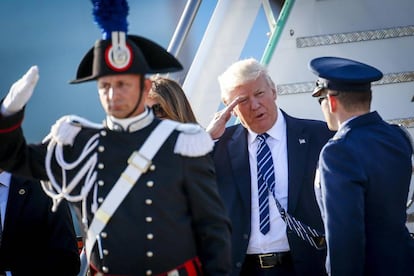Trump proposes drastic aid cuts to Mexico and Central America
Drug-related violence and poverty drive illegal immigration, but spending on these areas to fall by 45%
Officially, the priority is on programs related to combating criminal organizations and border security. But the reality is that the US Department of State’s 2018 budget proposals for Latin America mean drastic cuts. President Trump’s America First policy translates into $614 million less in aid to the region compared to last year, with Mexico and Central America – hit hard by turf wars between drug cartels and structural poverty, two factors that drive illegal immigration to the United States – the most affected.

Trump made humiliating Mexico one of the pillars of his election campaign, along with scapegoating undocumented migrants for his country’s ills. He promised to build a wall along the border with Mexico to halt “rapists and drug traffickers” and continues to insist that he will build the wall and that Mexico will pay for it.
Paradoxically, the State Department’s budget, which has been slashed, but could be modified as it makes its way through Congress, reduces aid to Mexico and Guatemala to combat drug trafficking and improve security.
The Trump administration’s proposals, released on Tuesday as the president arrived in Italy, where he met with Pope Francis, will see Mexico receive $87.7 million in aid next year, a 45.3% drop on 2016. The amount to be spent on security and fighting drug trafficking will fall from $100 million to $60 million. Funding to combat corruption will increase slightly, but money for defending human rights and strengthening the rule of law will be cut by half. Aid to help overhaul the armed forces there will fall to less than a quarter. More than 100,000 people have died in Mexico since 2006 in drug cartel-related violence.
The White House insists it will continue to address the “root causes” of instability in Central America
Similar cuts will be applied to aid to Guatemala, El Salvador and Honduras, the three countries that supply most of the undocumented migrants who make their way through Mexico to the United States.
The Trump administration’s decision to cut aid undermines the strategy of Barack Obama to strengthen the institutions of these countries, particularly in the wake of the 2014 crisis that saw huge numbers of unaccompanied minors make their way into the United States.
Under the budget proposals, Guatemala would receive $80.7 million, a 40% cut on 2016, with Honduras and El Salvador, respectively, being assigned $67.8 million and $46.3 million, a cut of around a third. Aid to Nicaragua, Costa Rica and Panama will also be slashed.
Speaking to reporters on Tuesday, Hari Sastry, director of the office of US foreign assistance resources at the State Department, said that while funding was being cut, the aim was to prioritize programs focused on interrupting the activities of transnational criminal organizations, strengthening border security and combating corruption and insisted that the “root causes” of instability in Central America would continue to be addressed.
Arrivals of undocument immigrants fell sharply in April
Arrivals of undocumented immigrants from Mexico to the United States have fallen sharply in the first months of the Trump presidency. US police detained 15,780 people in April, around 1,000 fewer than in March, the month with the lowest number of arrivals since the year 2000. Experts attribute the fall in numbers, which could be temporary, to the new administration’s tough polices, which have made it easier to deport people without papers.
The State Department’s cuts will also affect other Latin American nations. There will be no aid to Cuba, which in 2016 received $20 million in funding for human rights and civil society projects. A $6.5 million program created for Venezuela to strengthen good governance and respect for democracy also disappears.
Since taking office, Trump has toughened his rhetoric toward Havana, but so far has not made any changes to the diplomatic thaw begun under Obama. He has also toughened sanctions on members of the government of Venezuela in light of the country’s ongoing political crisis.
English version by Nick Lyne.
Tu suscripción se está usando en otro dispositivo
¿Quieres añadir otro usuario a tu suscripción?
Si continúas leyendo en este dispositivo, no se podrá leer en el otro.
FlechaTu suscripción se está usando en otro dispositivo y solo puedes acceder a EL PAÍS desde un dispositivo a la vez.
Si quieres compartir tu cuenta, cambia tu suscripción a la modalidad Premium, así podrás añadir otro usuario. Cada uno accederá con su propia cuenta de email, lo que os permitirá personalizar vuestra experiencia en EL PAÍS.
¿Tienes una suscripción de empresa? Accede aquí para contratar más cuentas.
En el caso de no saber quién está usando tu cuenta, te recomendamos cambiar tu contraseña aquí.
Si decides continuar compartiendo tu cuenta, este mensaje se mostrará en tu dispositivo y en el de la otra persona que está usando tu cuenta de forma indefinida, afectando a tu experiencia de lectura. Puedes consultar aquí los términos y condiciones de la suscripción digital.








































